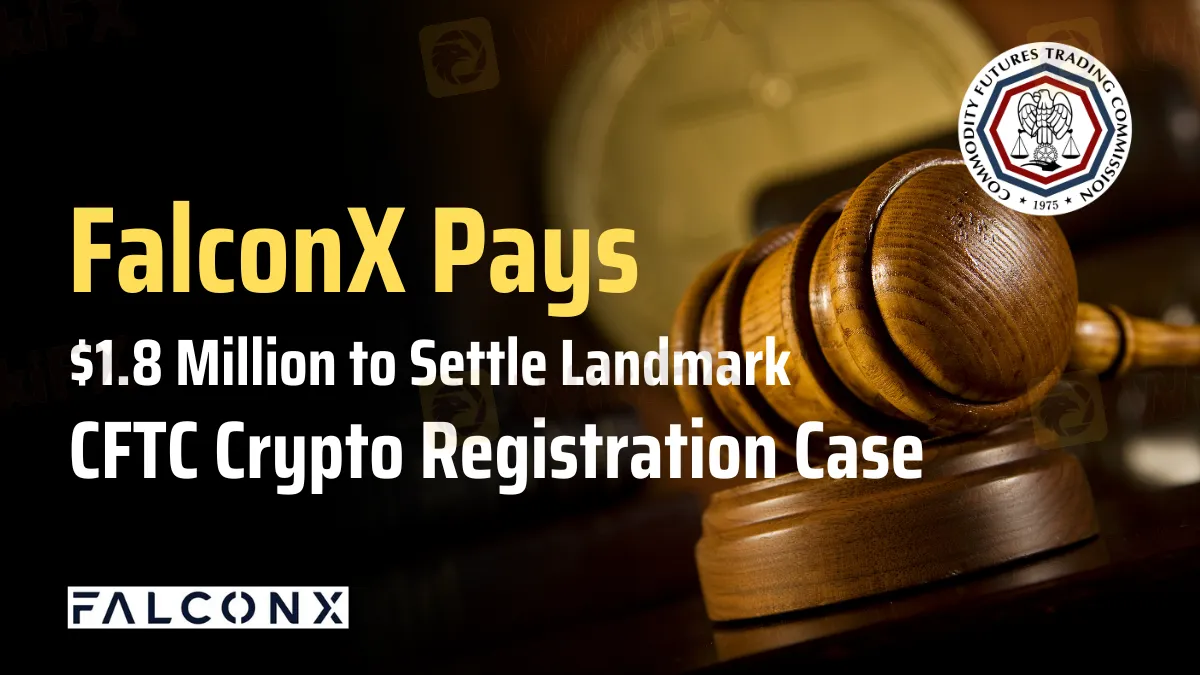简体中文
繁體中文
English
Pусский
日本語
ภาษาไทย
Tiếng Việt
Bahasa Indonesia
Español
हिन्दी
Filippiiniläinen
Français
Deutsch
Português
Türkçe
한국어
العربية
FalconX Pays $1.8 Million to Settle Landmark CFTC Crypto Registration Case
Abstract:FalconX settles with CFTC for $1.8 million in the first action against an unregistered FCM facilitating access to digital asset exchanges.

Falcon Labs, also referred to as FalconX, has settled with the U.S. Commodity Futures Trading Commission (CFTC) for $1.8 million in a ground-breaking action. This is the first time the CFTC has taken action against an unregistered futures commission merchant (FCM) who made it easier to access markets for digital assets.
According to the Monday CFTC decision, Falcon Labs, a Seychelles-based company, served as an intermediary by enabling its clients to trade on several digital asset exchanges. It follows that the company ought to have been an FCM registered with the CFTC. Falcon Labs accepted the large penalties without confirming or rejecting the results.
The CFTC claims Falcon Labs traded futures and swaps directly on digital asset exchanges, such as the well-known Binance.com, using sub-accounts. Following the CFTC's March 2023 allegations against Binance and its former CEO, Changpeng Zhao, which also led to a settlement, comes this action.
In reaction to the accusations made against Binance, Falcon Labs willingly changed its procedures, most notably improving the way it gathers client information and updating its KYC procedures. FalconX's clientele fell precipitously as a result of these changes; half of its Edge clients left. A lesser punishment was the outcome of the CFTC's recognition of Falcon Labs' cooperation and repair efforts.
Director of Enforcement Ian McGinley of the CFTC stressed that the organization wants to urge other illicitly operating digital asset intermediaries to come forward. “The CFTC hopes to encourage other illegal digital asset intermediaries operating to report their activities to the agency by recognizing Falcon Labs substantial cooperation and remediation in this order,” McGinley said.

FalconX served as a crypto prime broker by offering institutional clients—some of which were American—access to some cryptocurrency exchanges for trading derivatives, including futures and swaps via its “Edge” product. Though FalconX claimed to be the “largest digital asset prime brokerage,” the enforcement action resulted from improper CFTC registration.
This settlement's effects will probably be seen across the cryptocurrency sector, underscoring the need for the following regulations. With its position, the CFTC warns other unregistered companies operating in the digital asset market that it is watchful and ready to impose strict enforcement of its rules.
Moreover, FalconX's subsidiary, FalconX Bravo, has been moving toward compliance as shown by its registration as a swap dealer with the CFTC since last August. This case emphasizes how regulatory frameworks around digital assets are always changing and how businesses must comply with the law.
Regulators are looking at the crypto business more and more because of its quick expansion and creativity. This historic case establishes a standard and could make other companies reevaluate their compliance procedures and regulatory standing to avoid paying comparable fines.
A major problem as the market for digital assets grows is finding the right mix between encouraging innovation and guaranteeing regulatory compliance. FalconX's CFTC settlement demonstrates both the agency's dedication to upholding order in this rapidly expanding industry and the repercussions of non-compliance.
Finally, FalconX's $1.8 million settlement with the CFTC highlights the need for appropriate registration and compliance with regulatory requirements, which is a momentous occasion in cryptocurrency regulation. This situation should function as a warning to other intermediates of digital assets to make sure they comply with legal standards.

Disclaimer:
The views in this article only represent the author's personal views, and do not constitute investment advice on this platform. This platform does not guarantee the accuracy, completeness and timeliness of the information in the article, and will not be liable for any loss caused by the use of or reliance on the information in the article.
Read more

What Qualities of a Broker Help Professional Traders Achieve Success?
Know the key qualities of a broker that professional traders need, from fast execution to robust security and 24/7 support, to enhance trading success.

Rising Oil Prices Signaling a Bullish Market Ahead - Check Here!
Oil prices climb with a sharp U.S. crude stocks drop and Venezuela tariffs. Russia-Ukraine talks limit gains. Get insights on Brent, WTI, and oil market trends.

Crypto-to-Cash Transfers Now Available for UK and Europe
Crypto-to-Cash transfers are now available for UK and Europe users through the eToro platform, enabling them to transfer crypto-assets to their wallets and convert them into cash for trading and investment.

Fake Website Forex Scam, Arrests Two for Duping 100+ Investors
Chennai Cyber Crime exposes forex trading scam, arrests two men for cheating 100+ investors via fake websites. Beware of fraudulent investment schemes.
WikiFX Broker
Latest News
Forex Market Outlook: Key Currency Pairs and Trading Strategies for March 24–28, 2025
Singapore Police Crack Down on Scams: $1.9M Seized, 25 Arrested
Gold Prices Swing Near Record Highs
XTB Opens New Dubai Office
Africa Cybercrime Bust: Over 300 Arrested in Fraud Crackdown
The Growing Threat of Fake Emails and Phishing Scams
Hong Kong Banks and Authorities Collaborate to Freeze Fraudulent Accounts Faster
SocialFi and the Forex Market: A New Era for Decentralized Social Trading?
Is Billion Bucks Fx Scam?
BaFin Halts USDe Token Issuance, Citing Serious Compliance Failures
Currency Calculator







